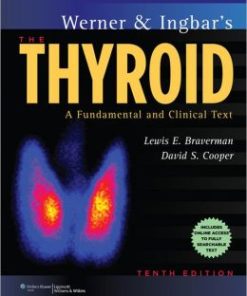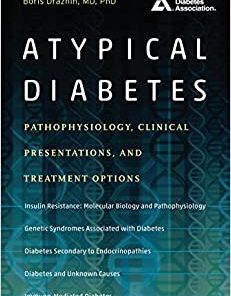Discover the Best Endocrinology Books to Advance Your Knowledge
Discover the Best Endocrinology Books Now!
Are you looking for the best endocrinology books to help you understand and manage your condition? Look no further than SurgeryBook.net! Our selection of endocrinology books is comprehensive, up-to-date, and written by leading experts in the field. Whether you’re a patient, a medical professional, or just someone who wants to learn more about endocrinology, we have the perfect book for you. With our easy-to-use search engine, you can quickly find the right book for your needs. Plus, our secure checkout process ensures that your purchase is safe and secure. So don’t wait any longer – explore our selection of endocrinology books today and start learning more about this fascinating field! Visit SurgeryBook.net now!
.
ENDOCRINOLOGY BOOKS
Endocrinology in Clinical Practice, 2nd Edition (Original PDF from Publisher)
ENDOCRINOLOGY BOOKS
ENDOCRINOLOGY BOOKS
Churchill’s Pocketbook of Diabetes, 2nd Edition (Original PDF from Publisher)
ENDOCRINOLOGY BOOKS
Harrison’s Endocrinology, 3rd Edition (Original PDF from Publisher)
ENDOCRINOLOGY BOOKS
Textbook of Endocrine Physiology, 6th Edition (Original PDF from Publisher)
ENDOCRINOLOGY BOOKS
ENDOCRINOLOGY BOOKS
Diabetic Foot : A Comprehensive Guide for Clinicians (Original PDF from Publisher)
ENDOCRINOLOGY BOOKS
ENDOCRINOLOGY BOOKS
Incretin Biology – A Practical Guide: GLP-1 and GIP Physiology
ENDOCRINOLOGY BOOKS
Endocrine Secrets, 6th Edition (ORIGINAL PDF from Publisher)
ENDOCRINOLOGY BOOKS
Patterson’s Allergic Diseases, 7th Edition (Original PDF from Publisher)
ENDOCRINOLOGY BOOKS
ENDOCRINOLOGY BOOKS
Diabetes Care at a Glance (At a Glance (Nursing and Healthcare)) (Original PDF from Publisher)
ENDOCRINOLOGY BOOKS
Physiopathologie du diabète: Mécanismes d¿une pandémie silencieuse (Original PDF from Publisher)
ENDOCRINOLOGY BOOKS
Antidiabetic Potential of Plants in the Era of Omics (Original PDF from Publisher)
ENDOCRINOLOGY BOOKS
Posterior Retroperitoneoscopic Adrenalectomy (Original PDF from Publisher)
ENDOCRINOLOGY BOOKS
Endocrine Pathology (Encyclopedia of Pathology) (Original PDF from Publisher)
ENDOCRINOLOGY BOOKS
ENDOCRINOLOGY BOOKS
Intensive Review of Endocrinology and Metabolism 2022 (CME VIDEOS)
ENDOCRINOLOGY BOOKS
ENDOCRINOLOGY BOOKS
ENDOCRINOLOGY BOOKS
[email protected] Endocrinology Update Review Course 2022 (CME VIDEOS)
ENDOCRINOLOGY BOOKS
ENDOCRINOLOGY BOOKS
Nuclear Medicine in Endocrine Disorders: Diagnosis and Therapy (Original PDF from Publisher)
ENDOCRINOLOGY BOOKS
Head & Neck Endocrine Surgery: A Comprehensive Textbook, Surgical, and Video Atlas (EPUB)
ENDOCRINOLOGY BOOKS
ENDOCRINOLOGY BOOKS
Diabetes: Clinician’s Desk Reference, 2nd Edition (Original PDF from Publisher)
ENDOCRINOLOGY BOOKS
ENDOCRINOLOGY BOOKS
ENDOCRINOLOGY BOOKS
Introduction
Are you looking to advance your knowledge in endocrinology? Look no further! Discover the Best Endocrinology Books to Advance Your Knowledge is here to help. This guide provides an overview of the best endocrinology books available, so you can find the perfect one for your needs. Whether you're a student, medical professional, or just curious about the field, this guide will help you find the right book to expand your understanding of endocrinology. With detailed reviews and ratings, you'll be able to make an informed decision on which book is best for you. Get ready to take your endocrinology knowledge to the next level!
Overview of Endocrinology: A Comprehensive Guide to the Study of Hormones
Endocrinology: A Comprehensive Guide to the Study of Hormones is an essential resource for anyone interested in learning about hormones and their role in the body. This comprehensive guide provides a thorough overview of endocrinology, from basic concepts to advanced topics. It covers the anatomy and physiology of the endocrine system, the different types of hormones and their functions, and the various diseases and disorders associated with hormone imbalances. The book also explores the latest research and treatments available for endocrine-related conditions.
The book begins by introducing readers to the basics of endocrinology, including the structure and function of the endocrine system, the different types of hormones, and how they interact with each other. It then delves into the various diseases and disorders associated with hormone imbalances, such as diabetes, thyroid disorders, and infertility. Readers will learn about the diagnosis and treatment of these conditions, as well as the latest research and advances in endocrinology.
The book also covers the use of hormone replacement therapy, which can be used to treat certain conditions, such as menopause and hypogonadism. It explains the risks and benefits of this type of therapy, as well as the potential side effects. Additionally, it discusses the use of natural supplements and lifestyle changes to help manage hormone levels.
Finally, Endocrinology: A Comprehensive Guide to the Study of Hormones provides readers with an in-depth look at the latest research and advances in endocrinology. It includes information on new treatments and therapies, as well as the latest developments in the field. This comprehensive guide is an invaluable resource for anyone interested in learning more about hormones and their role in the body.
The Role of Hormones in Metabolism and Disease
Understanding the Endocrine System: An Introduction to Its Anatomy and Physiology
The endocrine system is a complex network of glands and organs that produce hormones to regulate many bodily functions. It is responsible for controlling growth, metabolism, reproduction, and other important processes. Understanding the anatomy and physiology of the endocrine system is essential for maintaining good health.
The endocrine system consists of several major glands, including the pituitary, thyroid, parathyroid, adrenal, pancreas, ovaries, and testes. Each gland produces hormones that are released into the bloodstream and travel to target organs or tissues. These hormones act as chemical messengers, telling the body how to respond to various stimuli.
The pituitary gland is located at the base of the brain and is often referred to as the “master gland” because it controls the activity of other endocrine glands. It produces hormones that regulate growth, reproduction, and metabolism. The thyroid gland is located in the neck and produces hormones that regulate metabolism and energy levels. The parathyroid glands are four small glands located near the thyroid and produce hormones that regulate calcium levels in the blood. The adrenal glands are located on top of the kidneys and produce hormones that regulate stress responses. The pancreas is located behind the stomach and produces hormones that regulate blood sugar levels. The ovaries are located in the female reproductive system and produce hormones that regulate the menstrual cycle and fertility. The testes are located in the male reproductive system and produce hormones that regulate sperm production and male characteristics.
In addition to these major glands, there are also several other endocrine glands located throughout the body. These include the pineal gland, thymus, hypothalamus, and others. Each of these glands produces hormones that help regulate different bodily functions.
Understanding the anatomy and physiology of the endocrine system is essential for maintaining good health. By understanding how the endocrine system works, we can better understand how to keep our bodies functioning properly.
Endocrinology: Diagnosis and Treatment of Endocrine Disorders
Endocrinology is a branch of medicine that focuses on the diagnosis and treatment of endocrine disorders. Endocrine disorders are conditions that affect the body’s hormones, which are chemical messengers that regulate many bodily functions. Endocrine disorders can cause a wide range of symptoms, including fatigue, weight gain or loss, changes in mood, and changes in sexual function.
The most common endocrine disorders include diabetes, thyroid disease, adrenal gland disorders, pituitary gland disorders, and reproductive hormone imbalances. Diabetes is a disorder in which the body does not produce enough insulin or cannot use the insulin it produces effectively. Thyroid disease is an imbalance of the hormones produced by the thyroid gland, which can lead to either hyperthyroidism (overactive thyroid) or hypothyroidism (underactive thyroid). Adrenal gland disorders involve an overproduction or underproduction of hormones from the adrenal glands, which can cause a variety of symptoms. Pituitary gland disorders involve an imbalance of hormones produced by the pituitary gland, which can lead to problems with growth, fertility, and other bodily functions. Reproductive hormone imbalances involve an imbalance of hormones related to reproduction, such as estrogen and testosterone, which can lead to infertility, menstrual irregularities, and other issues.
Diagnosis of endocrine disorders typically involves a physical exam, blood tests, imaging tests, and other laboratory tests. Treatment of endocrine disorders depends on the specific condition, but may include lifestyle modifications, medications, and/or surgery. Lifestyle modifications may include dietary changes, exercise, and stress management. Medications may be used to supplement hormones or to block the production of certain hormones. Surgery may be necessary to remove tumors or to repair damaged organs.
Endocrinology is an important field of medicine that helps diagnose and treat endocrine disorders. With proper diagnosis and treatment, many endocrine disorders can be managed successfully.
Endocrinology: A Comprehensive Guide to Clinical Practice and Research
Endocrinology: A Comprehensive Guide to Clinical Practice and Research is an essential resource for medical professionals, researchers, and students interested in the field of endocrinology. This comprehensive guide provides a thorough overview of the diagnosis, treatment, and management of endocrine disorders. It covers the fundamentals of endocrinology, including anatomy and physiology, pathophysiology, clinical presentation, laboratory testing, imaging, and pharmacology. The book also includes detailed information on the diagnosis and management of common endocrine disorders, such as diabetes, thyroid disease, pituitary disorders, and adrenal disorders.
The book is divided into four sections. The first section provides an introduction to endocrinology, including an overview of the endocrine system, its hormones, and their functions. The second section focuses on the diagnosis and management of endocrine disorders, providing detailed information on the evaluation and treatment of various endocrine conditions. The third section covers research methods and techniques used in endocrinology, including epidemiology, biostatistics, and molecular biology. The fourth section provides an overview of current trends in endocrinology, including new treatments and therapies.
Endocrinology: A Comprehensive Guide to Clinical Practice and Research is an invaluable resource for medical professionals, researchers, and students interested in the field of endocrinology. It provides a comprehensive overview of the diagnosis, treatment, and management of endocrine disorders, as well as detailed information on research methods and techniques used in endocrinology. This book is an essential resource for anyone looking to gain a better understanding of endocrinology and its related topics.
Conclusion
In conclusion, endocrinology is a complex and fascinating field of study. With the right resources, you can gain a better understanding of the subject and advance your knowledge. The best endocrinology books provide comprehensive coverage of the topic, from basic concepts to more advanced topics. They are written by experts in the field and offer valuable insight into the workings of the endocrine system. Whether you’re a student or a professional, these books can help you gain a deeper understanding of endocrinology and its implications for human health






























